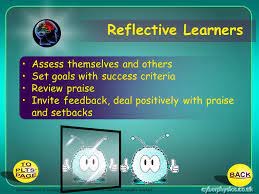Introduction
Personal Learning and Thinking Skills (PLTS) are a set of skills that include creative thinking, independent enquiry, reflective learning, team working, self-management and effective participation. Over time, these skills have become vital for individuals to succeed in life and work in the 21st century. This article aims to explore the importance of reflection in PLTS and how it helps people grow and improve personally and professionally.
The Power of Reflection in PLTS
Reflection has always been a key component of personal development. It allows individuals to review their experiences, evaluate their actions, draw lessons from past experiences, and continuously improve themselves. Reflective learning plays a significant role in enhancing PLTS for several reasons.
1. Enhancing Creative Thinking: Reflective learning enables individuals to analyze situations and think creatively about new approaches or solutions. By regularly reflecting on their experiences, people can discover novel ways of addressing problems or create better strategies for future tasks.
2. Developing Independent Enquiry: Reflection helps in building one’s independent enquiry skills by encouraging them to question their assumptions and beliefs critically. This self-questioning process promotes an open-minded attitude towards learning and understanding perspectives different from one’s own.
3. Improving Team Working Skills: When individuals reflect on their team working experience or group project dynamics, they can identify areas where they may have struggled or excelled. This understanding enables them to be more aware of their strengths and weaknesses while working with others, leading to better collaboration and communication with teammates.
4. Boosting Self-Management: Reflecting on personal achievements or setbacks gives individuals valuable insights into their limitations and capabilities. This awareness aids in setting realistic goals for oneself and determining the necessary steps needed to achieve them effectively.
5. Strengthening Effective Participation: The act of reflection makes participants more committed to continuous improvement through self-evaluation. By consistently evaluating their participation in various activities and projects, they become more proactive, responsible, and dedicated members of a team.
Strategies for Reflective Learning
To fully harness the power of reflection in PLTS, individuals can adopt some practical strategies:
1. Establish a reflection routine: Setting aside time regularly to reflect on experiences, thoughts and feelings allows individuals to build a habit of self-evaluation. This can range from journaling or blogging to maintaining a reflective diary.
2. Seek feedback from others: Gathering feedback from peers, mentors, or supervisors can provide valuable insights into how others perceive one’s work or behavior. This additional input can help individuals reflect more comprehensively on their performance and areas needing improvement.
3. Utilize reflective models: Following established models for reflective learning, such as Kolb’s Experiential Learning Cycle or Gibbs’ Reflective Cycle, can guide individuals to engage in deeper levels of reflection.
4. Engage in mindfulness: Practicing mindfulness techniques like meditation or deep breathing helps individuals develop awareness of their thought processes and emotions.
Conclusion
Ultimately, reflecting on PLTS provides a myriad of benefits for individuals seeking growth and improvement in various aspects of life. By investing time and effort into reflective learning practices, people gain invaluable knowledge about themselves that translates into enhanced personal development and professional success. As we continue to navigate our complex world filled with challenges and opportunities, the act of reflection becomes an even more crucial skill for thriving in the 21st century.





